-
 +3 +1
+3 +1What Is a Particle?
It has been thought of as many things: a pointlike object, an excitation of a field, a speck of pure math that has cut into reality. But never has physicists’ conception of a particle changed more than it is changing now.
-
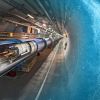 +2 +1
+2 +1Scientists use LHC to hunt dark matter siblings
Dark matter has long frustrated researchers. It seems to make up most of our universe, yet it barely interacts with that universe. And despite a plethora of active experiments hunting for dark matter, so far they’ve all turned up empty. That has some researchers turning to the next best thing: other dark particles. Our world of normal matter has lots of different particles, so perhaps there’s a whole dark world of particles as well. To be clear, no one’s found these either, and there’s even less proof for their existence.
-
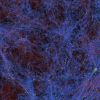 +18 +1
+18 +1Scientists invent way to trap mysterious ‘dark world’ particle at Large Hadron Collider
Now that they’ve identified the Higgs boson, scientists at the Large Hadron Collider have set their sights on an even more elusive target. All around us is dark matter and dark energy—the invisible stuff that binds the galaxy together, but which no one has been able to directly detect. “We know for sure there’s a dark world, and there’s more energy in it than there is in ours,” said LianTao Wang, a University of Chicago professor of physics who studies how to find signals in large particle accelerators like the LHC.
-
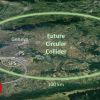 +24 +1
+24 +1Cern plans for even larger hadron collider
Cern has published its ideas for a £20bn successor to the Large Hadron Collider, given the working name of Future Circular Collider (FCC). The Geneva based particle physics research centre is proposing an accelerator that is almost four times longer and ten times more powerful. The aim is to have the FCC hunting for new sub-atomic particles by 2050. Critics say that the money could be better spent on other research areas such as combating climate change.
-
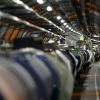 +13 +1
+13 +1£720m Large Hadron Collider upgrade 'could upend particle physics'
A massive project to supercharge the world’s largest particle collider launched on Friday in the hope that the beefed-up machine will reveal fresh insights into the nature of the universe. The 950m Swiss franc (£720m) mission will see heavy equipment, new buildings, access shafts and service tunnels installed, constructed and excavated at the Large Hadron Collider (LHC) at Cern, the particle physics laboratory on the edge of Geneva.
-
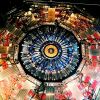 +30 +1
+30 +1Measurements from CERN suggest the possibility of a new physics
We're about to lift the veil to a new universe. By Brad Bergan.
-
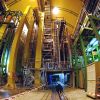 +14 +1
+14 +1LHC pops out a new particle that could test the strong force
Researchers on the LHCb experiment at CERN’s Large Hadron Collider have found a new particle, unlike any other seen yet, which could help study one of the universe’s four fundamental forces. By Jacob Aron and Leah Crane.
-
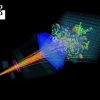 +29 +1
+29 +1Large Hadron Collider discovers five hidden subatomic particles
Five new particles have been discovered 'hiding in plain sight' at the Large Hadron Collider. The discovery comes from the collider's LHCb detector, or LHC beauty, which searches for objects such as antimatter. The five new particles are examples of baryons, which means they are made up of three fundamental particles called quarks, and all of them were discovered at once. "The exceptionality of this discovery is that observing five new states all at once is a rather unique event," said CERN's Stefania Pandolfi.
-
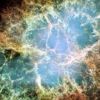 +19 +1
+19 +1Physicists Catch Antimatter and Matter Misbehaving
Experiments at the Large Hadron Collider reveal subtle distinctions in how matter and antimatter decay. By Jesse Emspak.
-
 +27 +1
+27 +1Ghost particles may explain why gravity is so surprisingly weak
Gravity is weaker than it should be – a new theory suggests that’s because the universe is full of invisible particle families which ignore each other.
-
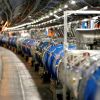 +47 +1
+47 +1The Particle That Wasn’t
Physicists working at the Large Hadron Collider reveal that mounds of data did not support the possibility of a new particle. By Dennis Overbye.
-
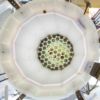 +15 +1
+15 +1Dark Matter Stays Dark
The most sensitive search yet for the mystery substance draws a blank after 20 months. By Sarah Lewin.
-
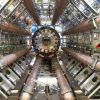 +1 +1
+1 +1Report: A Weasel Shut Down the Large Hadron Collider
A tiny mammal has reportedly brought the world’s largest scientific experiment to a halt. The Large Hadron Collider suffered a power outage last night, after a luckless weasel decided to chew on a 66-kilovolt power cable. It’s not the first time the LHC, a 17-mile superconductor that smashes atoms together at close to the speed of light, has run into trouble because of something small and cute. In 2009, the power went down after...
-
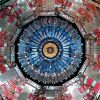 +17 +1
+17 +1CMS releases new batch of research data from LHC
Today, the CMS Collaboration at CERN has released more than 300 terabytes (TB) of high-quality open data. These include over 100 TB, or 2.5 inverse femtobarns (fb−1), of data from proton collisions at 7 TeV, making up half the data collected at the LHC by the CMS detector in 2011. This follows a previous release from November 2014, which made available around 27 TB of research data collected in 2010.
-
 +9 +1
+9 +1Why are theoreticians filled with wanderlust?
A large tin holding dozens of keys sits in the office of the [CERN] Theory Secretariat. Each one unlocks a stay on a Theory corridor. Nanie Perrin hands them out, and collects them back, in a constant game of musical chairs - or rather, musical offices. On the Secretariat’s board (the only whiteboard in the corridor), departures are listed in red, arrivals in green.. By Corinne Pralavorio.
-
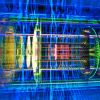 +24 +1
+24 +1First particle-beams of 2016 in Cern’s Large Hadron Collider
The LHC has begun circulating proton beams again, after a 13-week maintenance break. What are the next steps? By Jon Butterworth. (Mar. 25)
-
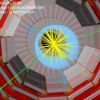 +19 +1
+19 +1Hints of new LHC particle get slightly stronger
One fresh analysis keeps alive physicists’ hope for a breakthrough, but another is disappointing. By Davide Castelvecchi and Elizabeth Gibney. (Mar. 17)
-
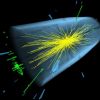 +3 +1
+3 +1Who ordered that?
An unexpected data signal that could change everything has particle physicists salivating.
-
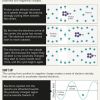 +13 +1
+13 +1CERN prepares to test revolutionary mini-accelerator
Machines that ‘surf’ particles on electric fields could reach high energies at a lower price.
-
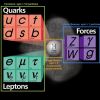 +28 +1
+28 +1Throwback Thursday: How The Higgs Gives Mass To The Universe
It’s been more than three years since we’ve found the Higgs boson. So how does it give particles mass?
Submit a link
Start a discussion




















